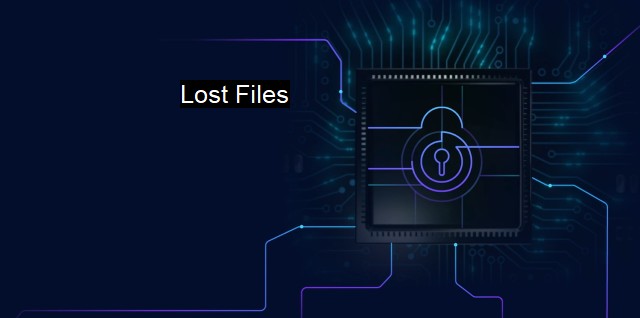What are Lost Files?
Protecting Against Lost Files: Exploring Implications and Antivirus Programs in the Digital Age's Cybersecurity Landscape.
"Lost Files," often referred to pertains to data or information that is inaccessible due to various reasons, such as virus attacks, hardware failures, accidental deletion, or systems crash. Exploring this term within the technology and information security domain provides a deep understanding of the implications, preventive measures, and remediation methods associated with lost files.At its core, the term “Lost Files” suggests that data has succumbed to circumstances that render it inaccessible or missing from its rightful location – this is usually in a computing environment. The data could be anything; text-based files like documents, spreadsheets, and html files, media files such as images, video, and audio, or any other type of file that a computer operating system can create and manage.
Lost files are often the result of harmful actions executed by malicious software. This malware is designed to compromise the confidentiality, integrity, or availability of data. strains of ransomware encrypt data, making it inaccessible until a ransom payment is made. In contrast, other types of malware species delete or move data, effectively orchestrating it as 'lost.'
Our increasingly networked world further complicates the issue. Today, files are not stored on a single, standalone computer. On the contrary, they are often spread across networked systems, cloud storage solutions, and synchronized across multiple devices. This elevates the odds of files going missing, either through syncing errors, network intrusion, or malicious actions performed remotely.
Tangential to this is the reality that technology is imperfect; hardware can fail, file systems can become corrupted, and software, including operating systems, can crash. All these occurrences can and often do contribute to files becoming lost. Worryingly, in most cases, the data is not retrievable, which can have dire consequences, particularly for businesses that have lost critical data.
The world in which lost files equate to permanently lost data has evolved substantially. Various attempts can be made to recover or restore such files using hardware and software recovery tools. For instance, software like data carving tools, which aid in locating and retrieving lost files by scourging the hard drive for remnants of lost data, can be invaluable. Restoration points and backups are also essential strategies to retrieve lost files. Automatic backup schedules, paired with off-site storage (cloud storage), are common methods generally used to mitigate data loss.
In another security initiative, antivirus software offers robust protection against most types of malware that lead to file loss. These applications perform regular system scans to detect and isolate threats, further protecting digital assets and limiting the potential for files to become lost. they do not offer complete protection and still require the user to engage in safe computing practices.
Promoting safe behaviour online, therefore building a human firewall, is another line of defence against the potential loss of files. Humans are often considered the weakest link in cybersecurity; thus, actions such as verifying the sources of email attachments and downloads, keeping all software (including operating systems) updated to benefit from the latest security patches, avoiding suspicious websites, and not clicking on questionable links can all help protect the integrity and location of files.
'Lost Files' embody a morose aspect of the digital realm—data that is unlocatable and potentially unrecoverable due to different circumstances. with the necessary countermeasures in place, such as regular backing up of essential data, utilization of antivirus applications, maintaining updated software, and cultivating a culture of cyber-awareness, the effects of lost files can be mitigated, aiding in sustaining and propelling the much-needed security in the cyber universe.

Lost Files FAQs
What should I do if I realize that some of my important files are lost due to a virus attack?
You can try to recover your lost files through some recovery software. However, it is important to note that there are some viruses which can permanently delete your files. It is always recommended to keep a backup of all your important data.Can antivirus software help in recovering lost files?
Antivirus software is not designed for file recovery services. Its main function is to protect your system from malware and viruses. However, some antivirus programs may have features that can help in restoring or recovering lost files. You can check with your antivirus provider to see if they offer any such services.What are the common causes of lost files in a system?
The common causes of lost files in a system include accidental deletion, hard drive failure, virus attacks, software crashes, and power outages.How can I prevent losing my files due to a virus attack?
You can prevent losing your files due to a virus attack by installing a reliable antivirus software and updating it regularly. You should also avoid clicking on suspicious links or downloading files from unknown sources. It is also a good practice to keep backups of all your important data.| | A | | | B | | | C | | | D | | | E | | | F | | | G | | | H | | | I | | | J | | | K | | | L | | | M | |
| | N | | | O | | | P | | | Q | | | R | | | S | | | T | | | U | | | V | | | W | | | X | | | Y | | | Z | |
| | 1 | | | 2 | | | 3 | | | 4 | | | 7 | | | 8 | | |||||||